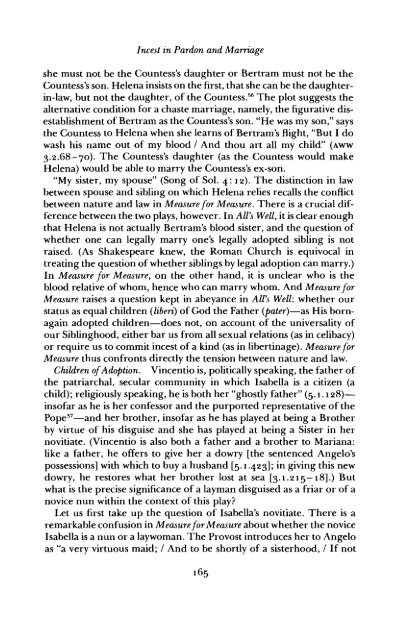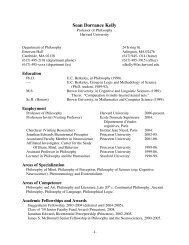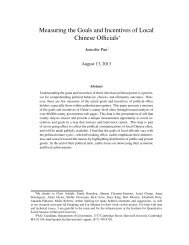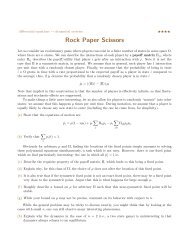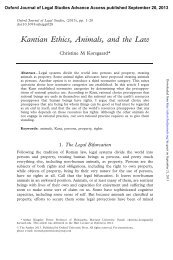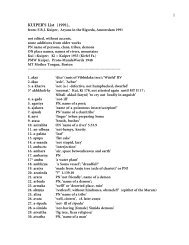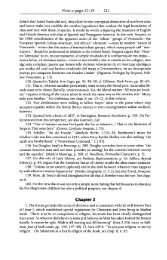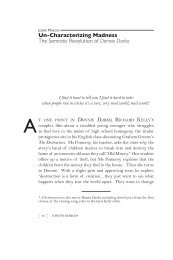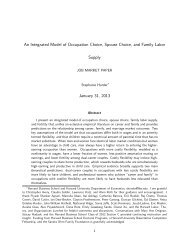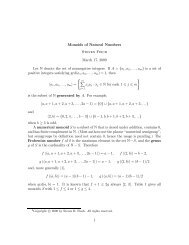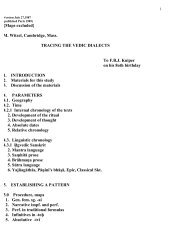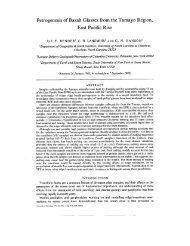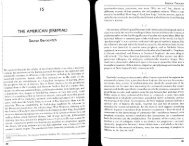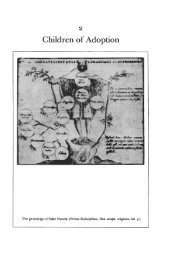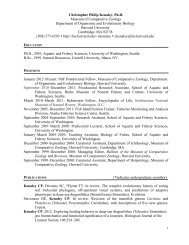Incest in Pardon and Marriage - People Fas Harvard
Incest in Pardon and Marriage - People Fas Harvard
Incest in Pardon and Marriage - People Fas Harvard
Create successful ePaper yourself
Turn your PDF publications into a flip-book with our unique Google optimized e-Paper software.
<strong>Incest</strong> <strong>in</strong> <strong>Pardon</strong> <strong>and</strong> Mawiage<br />
she must not be the Countess's daughter or Bertram must not be the<br />
Countess's son. Helena <strong>in</strong>sists on the first, that she can be the daughter<strong>in</strong>-law,<br />
but not the daughter, of the Counte~s.~~ The plot suggests the<br />
alternative condition for a chaste marriage, namely, the figurative disestablishment<br />
of Bertram as the Countess's son. "He was my son," says<br />
the Countess to Helena when she learns of Bertram's flight, "But I do<br />
wash his name out of my blood / And thou art all my child" (AWW<br />
3.2.68-70). The Countess's daughter (as the Countess would make<br />
Helena) would be able to marry the Countess's ex-son.<br />
"My sister, my spouse" (Song of Sol. 4: 12). The dist<strong>in</strong>ction <strong>in</strong> law<br />
between spouse <strong>and</strong> sibl<strong>in</strong>g on which Helena relies recalls the conflict<br />
between nature <strong>and</strong> law <strong>in</strong> Measure for Measure. There is a crucial difference<br />
between the two plays, however. In All's Well, it is clear enough<br />
that Helena is not actually Bertram's blood sister, <strong>and</strong> the question of<br />
whether one can legally marry one's legally adopted sibl<strong>in</strong>g is not<br />
raised. (As Shakespeare knew, the Roman Church is equivocal <strong>in</strong><br />
treat<strong>in</strong>g the question of whether sibl<strong>in</strong>gs by legal adoption can marry.)<br />
In Measure for Measure, on the other h<strong>and</strong>, it is unclear who is the<br />
blood relative of whom, hence who can marry whom. And Measure for<br />
Measure raises a question kept <strong>in</strong> abeyance <strong>in</strong> All's Well: whether our<br />
status as equal children (liberi) of God the Father (pater)-as His bornaga<strong>in</strong><br />
adopted children-does not, on account of the universality of<br />
our Sibl<strong>in</strong>ghood, either bar us from all sexual relations (as <strong>in</strong> celibacy)<br />
or require us to commit <strong>in</strong>cest of a k<strong>in</strong>d (as <strong>in</strong> libert<strong>in</strong>age). Measure for<br />
Measure thus confronts directly the tension between nature <strong>and</strong> law.<br />
Children of Adoption. V<strong>in</strong>centio is, politically speak<strong>in</strong>g, the father of<br />
the patriarchal, secular community <strong>in</strong> which Isabella is a citizen (a<br />
child); religiously speak<strong>in</strong>g, he is both her "ghostly father" (5.1.128)<strong>in</strong>sofar<br />
as he is her confessor <strong>and</strong> the purported representative of the<br />
Pope5'-<strong>and</strong> her brother, <strong>in</strong>sofar as he has played at be<strong>in</strong>g a Brother<br />
by virtue of his disguise <strong>and</strong> she has played at be<strong>in</strong>g a Sister <strong>in</strong> her<br />
novitiate. (V<strong>in</strong>centio is also both a father <strong>and</strong> a brother to Mariana:<br />
like a father, he offers to give her a dowry [the sentenced Angelo's<br />
possessions] with which to buy a husb<strong>and</strong> [5.1.423]; <strong>in</strong> giv<strong>in</strong>g this new<br />
dowry, he restores what her brother lost at sea [3.1.215-181.) But<br />
what is the precise significance of a layman disguised as a friar or of a<br />
novice nun with<strong>in</strong> the context of this play?<br />
Let us first take up the question of Isabella's novitiate. There is a<br />
remarkable confusion <strong>in</strong> Measure forMeasure about whether the novice<br />
Isabella is a nun or a laywoman. The Provost <strong>in</strong>troduces her to Angelo<br />
as "a very virtuous maid; / And to be shortly of a sisterhood, / If not


